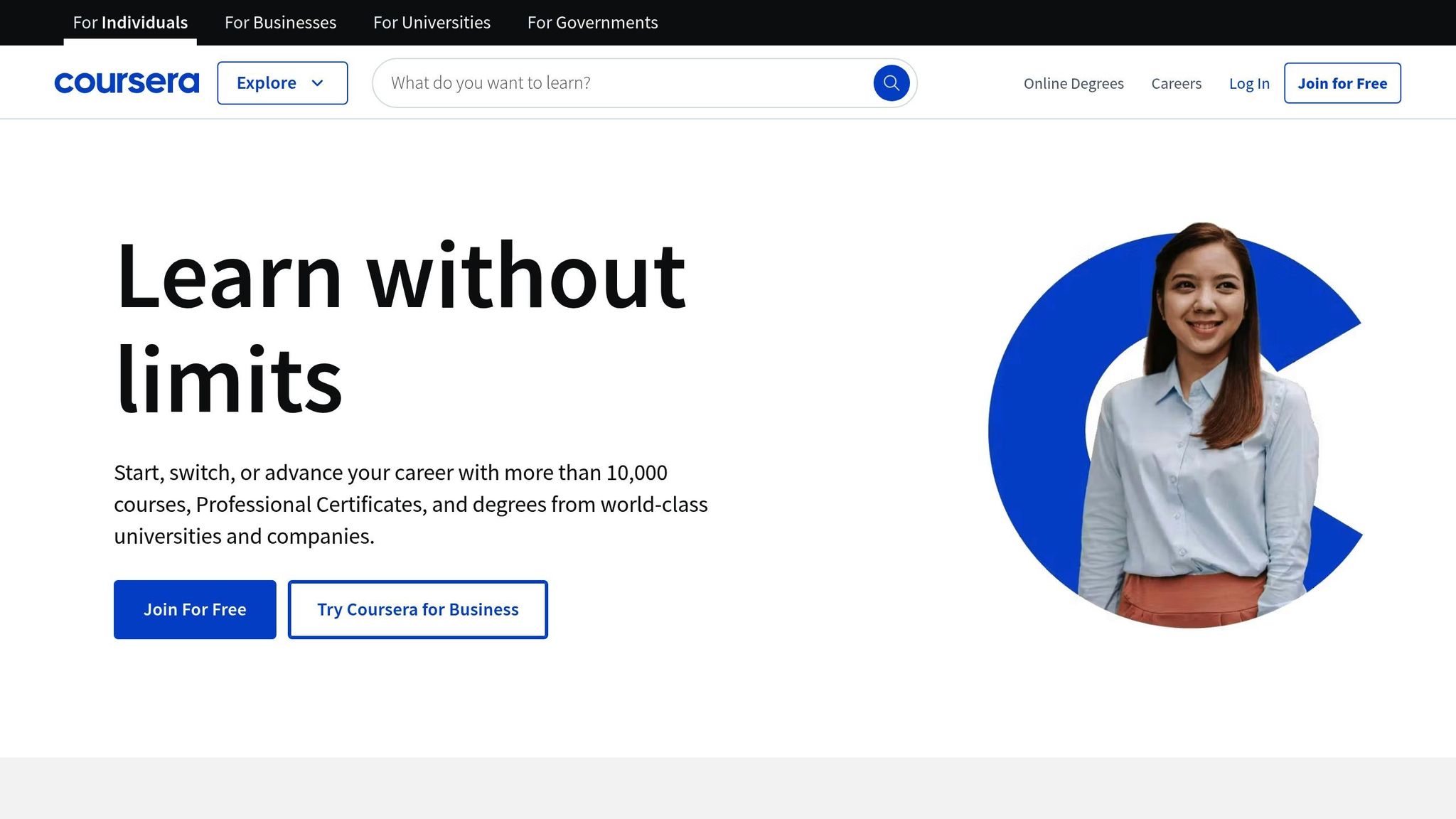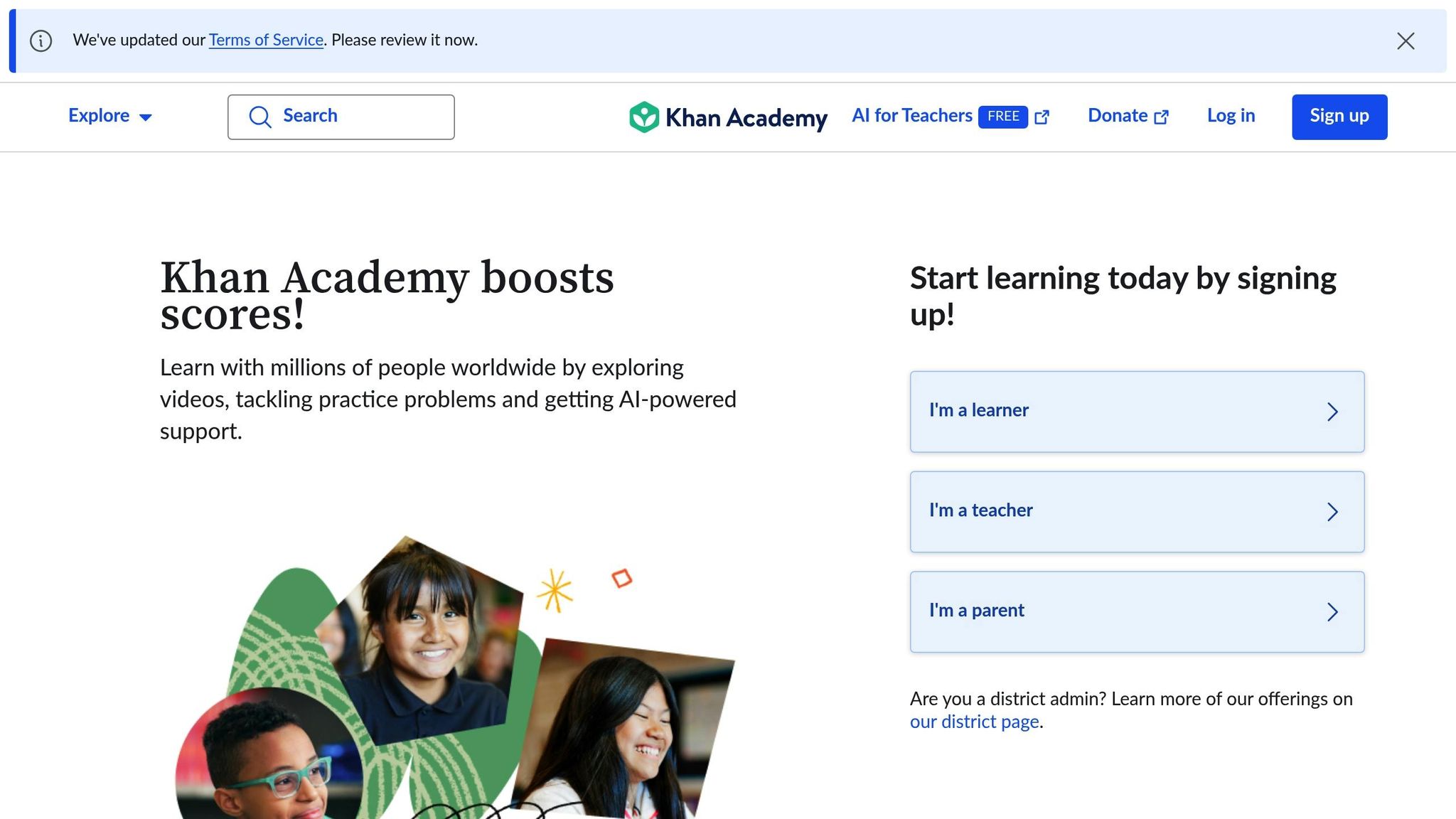Top Free Online Writing Courses for Beginners in 2025
Explore the best free online writing courses for beginners in 2025, covering essential skills from grammar to creative storytelling.

In 2025, mastering writing skills is essential for both personal and professional growth. Whether you're drafting emails, creating stories, or improving grammar, free online writing courses offer a flexible way to learn. Here's a quick summary of the best free courses available:
- Upskillist: Creative Writing Course – 16 weeks of storytelling, character building, and editing skills.
- Coursera (Wesleyan University): Writing for Beginners – Focuses on plot, character development, and writing style; includes peer reviews.
- edX (University of Queensland): English Grammar and Style – Strengthens grammar basics and writing mechanics.
- FutureLearn (Open University): Start Writing Fiction – Guides beginners in crafting characters and plots.
- Skillshare: Writing for Self-Discovery – Encourages reflective writing and self-expression.
- Khan Academy: Grammar and Writing – Self-paced lessons on grammar and punctuation.
- Reedsy: Creative Writing 101 – Offers narrative techniques and feedback for new writers.
Quick Comparison
| Course Name | Platform | Duration | Focus Areas | Certificate |
|---|---|---|---|---|
| Creative Writing Course | Upskillist | 16 weeks | Storytelling, Editing, Characters | Yes |
| Writing for Beginners | Coursera | 3–6 months | Plot, Character, Style | Yes (paid) |
| English Grammar and Style | edX | 8 weeks | Grammar, Style, Editing | Yes (paid) |
| Start Writing Fiction | FutureLearn | 8 weeks | Characters, Plot, Writing Practice | Optional |
| Writing for Self-Discovery | Skillshare | 2–3 weeks | Reflective Writing | No |
| Grammar and Writing | Khan Academy | Self-paced | Grammar, Punctuation, Mechanics | No |
| Creative Writing 101 | Reedsy | 4 weeks | Basics, Narrative Techniques | No |
How to Choose the Right Course
- Goal: Decide whether you want to improve grammar, write stories, or explore self-expression.
- Time: Pick a course that fits your schedule - short courses for quick learning or longer ones for in-depth practice.
- Features: Look for interactive exercises, peer reviews, and certificates if needed for professional growth.
Start with a course that aligns with your goals, set clear writing targets, and practice consistently to improve your skills.
Writer's Toolkit Online 2021 - free online creative writing courses
How to Choose a Free Writing Course
Choosing the right writing course can make a big difference in your learning experience. To help you pick the best one, here are some key factors to consider.
Course Duration and Time Commitment
Writing courses come in all lengths. Some are quick, lasting just 2–3 hours, while others stretch over several months. Short courses are great for focused learning, while longer ones give you more time to practice and dive deeper into the material.
Course Content and Structure
Make sure the course aligns with your goals and covers the basics of writing. Look for topics like:
- Storytelling Basics: Learn how to craft engaging narratives.
- Character and Plot Development: Build stories with depth and intrigue.
- Editing Skills: Hone your ability to revise and improve your work.
Learning Format and Flexibility
If you have a busy schedule, self-paced courses can be a great option. They let you learn at your own speed without the pressure of fixed deadlines.
Certification Benefits
While not always necessary, certificates can be useful. They:
- Show proof of your skills.
- Boost your professional credibility.
- Open doors to career opportunities.
Practice and Feedback
A good course should include writing assignments and exercises to help you apply what you’ve learned.
| Feature | Why It’s Important | How It Helps You |
|---|---|---|
| Practice Exercises | Reinforces learning | Strengthens your skills |
| Flexible Schedule | Fits into busy routines | Improves completion rates |
| Certificate Options | Recognizes achievements | Adds to your resume |
| Structured Content | Keeps learning organized | Builds a solid foundation |
Course Reviews and Ratings
Check user reviews and ratings. Courses with scores between 4.3 and 4.8 out of 5 often indicate high quality and satisfied learners.
Beyond just improving your writing, these courses can also enhance memory and boost your mood. Take a close look at these factors to find the course that meets your needs and goals.
1. Upskillist: Creative Writing Course

Upskillist's Creative Writing Course is designed for beginners, combining hands-on exercises with essential writing concepts to help you build confidence and sharpen your skills.
Course Structure and Duration
This 16-week course includes 32 lessons divided into four modules, each building on the last to create a solid foundation. Here's how it works:
- Complete about two lessons per week at your own pace
- Move through well-organized modules step by step
- Enjoy lifetime access to course materials for future reference
What You'll Learn
The course covers a wide range of creative writing techniques, from basic to advanced. Here's a breakdown:
| Module Focus | Skills You’ll Develop |
|---|---|
| Story Crafting | Plot building, narrative flow |
| Character Building | Creating characters, writing dialogue |
| Writing Techniques | Setting scenes, descriptive writing |
| Professional Tools | Editing, critical analysis |
Career Development Support
When you finish the course, you’ll receive:
- A diploma you can share
- The option to showcase your achievement on LinkedIn
- Access to Upskillist's career resources
Each lesson includes practical assignments to help you apply what you learn and improve your writing step by step.
Learning Experience
The course keeps things interactive and engaging throughout the 16 weeks. You’ll benefit from:
- Clear lessons paired with practical assignments
- Gradual skill-building to reinforce learning
- Guidance from experienced professionals
This hands-on approach not only teaches you the principles of writing but also helps you apply them effectively. It’s a great starting point for anyone looking to explore creative writing.
2. Coursera: Writing for Beginners by Wesleyan University

Wesleyan University offers a beginner-friendly creative writing course through Coursera. This program is part of Coursera's Creative Writing specialization and focuses on practical exercises to help students build a strong foundation in writing. It's designed for those just starting out, with a structure that works for both fast learners and those who prefer a slower pace.
Course Duration and Commitment
The course is structured to accommodate different schedules:
- Individual modules take about 1–4 weeks each.
- Completing the entire specialization may take 3–6 months.
Core Learning Components
The course is divided into focused modules that cover the basics of creative writing:
| Module | Focus Areas | Key Skills Developed |
|---|---|---|
| Craft of Plot | Story Structure | Storyboarding and narrative flow |
| Character Development | Character Creation | Writing dialogue, shaping character arcs |
| Writing Style | Technical Elements | Mastering description, voice, and tone |
Skill Development Areas
Students work on a range of skills, including:
- Technical Writing: Learn editing, proofreading, and revision techniques.
- Creative Growth: Tackle writer's block and develop new ideas.
- Professional Tools: Gain experience through peer reviews and improve content creation.
Learning Experience
A key feature of this course is its focus on peer review. This allows students to receive constructive feedback from others, helping them refine their writing and grow through collaboration.
3. edX: English Grammar and Style by UQ

The University of Queensland's English Grammar and Style course is designed for beginners who want to strengthen their grammar skills and improve their writing style. The self-paced structure makes it easy to fit into busy schedules.
What You’ll Learn
The course focuses on key areas, including:
- Grammar basics
- Writing mechanics
- Style techniques
- Editing skills
These topics provide a strong foundation for clear and effective writing.
Hands-On Practice
Interactive exercises and quizzes help reinforce what you’ve learned, ensuring you can apply the concepts effectively.
Track Your Progress
The course includes built-in assessments and examples from everyday writing scenarios. This allows learners to monitor their growth and apply grammar and style principles in professional, academic, or personal contexts. The flexible format ensures you can fully understand each concept before moving on.
4. FutureLearn: Start Writing Fiction by Open University

The Start Writing Fiction course from Open University is designed for beginners looking to dive into the world of creative storytelling. It provides step-by-step guidance to help new writers hone their fiction-writing skills through structured lessons and hands-on exercises.
Course Structure
-
Character Development
- Learn how to craft engaging protagonists and antagonists.
- Discover techniques for writing natural, believable dialogue.
- Build detailed backstories to bring characters to life.
-
Story Mechanics
- Understand the basics of plot structure.
- Get tips for creating impactful scenes.
- Explore how to manage pacing within your narrative.
-
Writing Practice
- Use prompts to spark your imagination.
- Participate in peer review sessions for collaborative feedback.
- Start building a portfolio of your written work.
This structure ensures a practical, hands-on approach to learning.
Practical Learning Experience
The course offers flexible scheduling, allowing participants to progress at their own pace while advancing from foundational concepts to more advanced techniques.
Interactive Elements
- Writing Workshops: Share your work and receive constructive feedback from peers.
- Journal Exercises: Sharpen your observational skills through guided writing tasks.
- Character Studies: Draw inspiration from real-life observations to create dynamic characters.
These activities, paired with ongoing feedback, help refine your writing skills.
Assessment and Feedback
Progress is tracked through a combination of peer reviews, instructor comments, and self-assessments.
Key Takeaways
- Build a consistent writing habit.
- Create a diverse collection of written pieces.
- Strengthen your ability to critically analyze texts.
- Learn how to give and accept constructive criticism effectively.
Completion Requirements
To complete the course, participants must finish assignments and actively engage in peer reviews.
5. Skillshare: Writing for Self-Discovery
Skillshare's Writing for Self-Discovery course is perfect for beginners looking to use writing as a tool for personal growth. This self-paced course encourages introspection and helps learners create a reflective writing habit. It’s all about tapping into your experiences and turning them into meaningful narratives.
The course includes exercises designed to clarify your thoughts and improve self-expression. Through reflective prompts and creative techniques, participants learn how to shape their experiences into stories while building confidence in their writing.
Since it’s online and requires very little to get started, this course makes it easy to explore your creativity and develop your unique voice.
6. Khan Academy: Grammar and Writing

Khan Academy's Grammar and Writing program is a great tool for improving written English. It offers structured lessons and interactive exercises that help you build skills step by step.
The program is divided into three main modules:
- Basic Grammar Fundamentals: Learn about parts of speech, sentence structure, and verb tenses.
- Punctuation Mastery: Get detailed lessons on using commas, semicolons, colons, and dashes.
- Writing Mechanics: Focus on writing clearly, staying organized, and communicating effectively.
Each lesson includes examples and provides instant feedback, allowing you to practice as much as needed to fully understand the material. The platform also tracks your progress, making it easy to see where you’re improving and what areas might need more work. According to a survey, 90% of U.S. teachers who have used Khan Academy found it effective.
What sets this course apart is its focus on practical use. Instead of just teaching rules, it shows how to apply grammar concepts in everyday writing. This approach helps boost confidence as you move from basic to more advanced topics.
You can study at your own pace, revisit lessons anytime, and use the analytics to monitor your progress. With its expert-designed content and user-friendly format, this program is a great starting point for anyone looking to build strong grammar and writing skills.
7. Reedsy: Creative Writing 101

Reedsy's Creative Writing 101 is designed to help beginners grasp the basics of creative writing through a structured and hands-on approach.
The course combines lectures with focused exercises that dive into essential topics like character development, plot structure, and narrative techniques. These elements work together to create a strong foundation for anyone starting their writing journey.
One standout feature is the feedback system, which offers detailed critiques on specific exercises. This helps students improve their skills while boosting their confidence over time.
In addition, the course provides extra resources, including a free video masterclass on novel writing, for those looking to tackle more advanced topics after covering the basics. With its mix of lectures, exercises, and personalized feedback, this course is a great addition to the free writing resources mentioned earlier.
Course Comparison Chart
Here’s a quick overview of various free writing courses:
| Course Name | Platform | Length | Main Topics | Key Features | Certificate |
|---|---|---|---|---|---|
| Creative Writing Course | Upskillist | 4‑6 weeks | Storytelling, Character Development, Plot Structure | Interactive classes, AI-powered tools, ongoing assessments | Yes |
| Writing for Beginners | Coursera (Wesleyan) | 4‑6 months | Academic writing, Script writing, Memoir writing | Peer review, Graded assignments, Instructor feedback | Yes (paid) |
| English Grammar and Style | edX (UQ) | 8 weeks | Grammar fundamentals, Writing style, Editing | Self‑paced learning, Practice exercises | Yes (paid) |
| Start Writing Fiction | FutureLearn | 8 weeks | Fiction writing, Character creation, Plot development | Interactive discussions, Writing workshops | Optional |
| Writing for Self‑Discovery | Skillshare | 2‑3 weeks | Personal writing, Reflection techniques | Project‑based learning, Community feedback | No |
| Grammar and Writing | Khan Academy | Self‑paced | Grammar basics, Writing mechanics | Practice exercises, Video lessons | No |
| Creative Writing 101 | Reedsy | 4 weeks | Creative writing basics, Narrative techniques | Detailed critiques, Video masterclass | No |
This chart helps you pick a course that fits your schedule and learning preferences. Options range from short, self-paced programs to more in-depth, multi-month courses.
Some platforms also offer extra perks like peer reviews or masterclasses. Take a look at the chart to find the course that aligns with your writing goals.
Making the Most of Your Writing Course
Here’s how you can get the best results from your writing course by focusing on clear goals, structure, and active participation.
Set Clear Goals
Define specific, measurable targets for your writing. For example:
- Write 500 words daily as practice
- Complete a short story draft (2,000–3,000 words) every two weeks
- Submit one polished piece for peer review each week
Having clear goals keeps you focused and motivated.
Stick to a Schedule
Set aside dedicated time each day for course activities like watching videos, completing exercises, and participating in discussions. A structured schedule helps you stay consistent and get the most out of interactive features.
Engage With Others
Make the most of discussion boards, live Q&A sessions, and group exercises. These tools provide valuable feedback and help you connect with other writers. Consider joining workshops or virtual writing rooms to further enhance your learning.
Use Extra Resources
Incorporate digital tools and personal journals into your routine to support your writing practice. These can help you stay organized and inspired.
Track Your Growth
Regularly evaluate your progress. Pay attention to:
- Course completion milestones
- Updates to your writing portfolio
- Results from skill assessments
- Achievement of personal writing goals
Adjust your approach based on what you learn from these evaluations.
Be an Active Learner
Take notes, apply new techniques immediately, and ask for feedback. Try out different writing styles and reflect on what works best for you. These habits will help you grow as a writer and prepare you for future challenges.
Next Steps
Now that you’ve explored course options, here’s how to kick off your writing journey.
Choose Your Focus Area
Decide what type of writing you want to pursue - fiction, business communication, or academic writing. Pick courses that match your goals, like storytelling basics for fiction or professional email writing for business.
Start with the Basics
Dave Chesson, Founder of Kindlepreneur, says: "A writer needs to keep improving his or her craft. Online writing courses aren't just for amateurs or writing hobbyists; they're for all writers."
Focus on courses that strengthen your core skills before moving on to advanced topics.
Plan Your Learning Path
Map out a clear plan: start with foundational courses, practice writing regularly, get feedback, and then explore advanced topics as you grow.
Track Your Progress
These free courses can open doors to freelance opportunities, self-publishing, and more. Keep an eye on how your skills improve over time.
Explore Advanced Courses
Once you’ve mastered the basics, challenge yourself with advanced classes to refine your craft even further.
Make Writing a Habit
Writing regularly doesn’t just improve your skills - it can also enhance memory and overall well-being. Incorporate it into your daily routine for both personal and professional growth.
Connect with Others
Join writing groups to share your work, get feedback, and build a network. Staying connected helps keep you motivated and accountable.
Keep learning, practicing, and improving. Your writing journey is just beginning.

